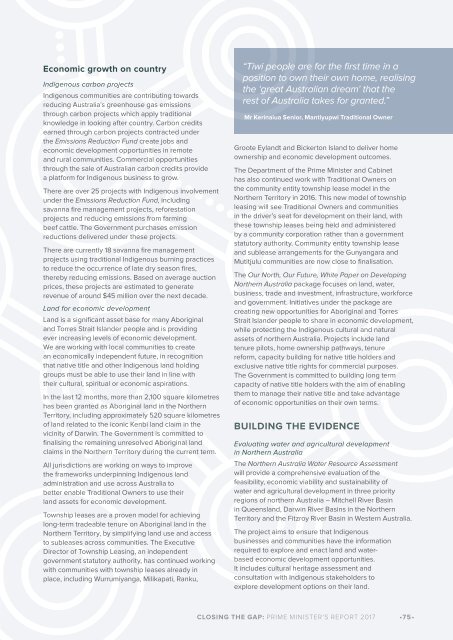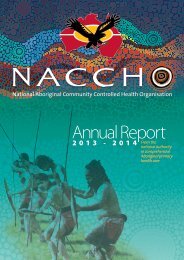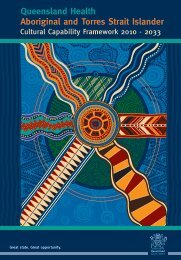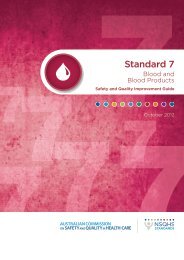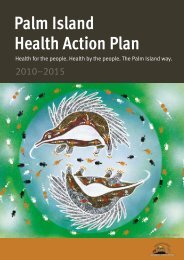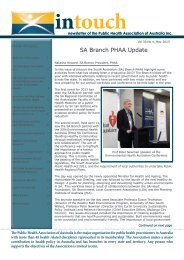CLOSING THE GAP
ctg-report-2017
ctg-report-2017
Create successful ePaper yourself
Turn your PDF publications into a flip-book with our unique Google optimized e-Paper software.
Economic growth on country<br />
Indigenous carbon projects<br />
Indigenous communities are contributing towards<br />
reducing Australia’s greenhouse gas emissions<br />
through carbon projects which apply traditional<br />
knowledge in looking after country. Carbon credits<br />
earned through carbon projects contracted under<br />
the Emissions Reduction Fund create jobs and<br />
economic development opportunities in remote<br />
and rural communities. Commercial opportunities<br />
through the sale of Australian carbon credits provide<br />
a platform for Indigenous business to grow.<br />
There are over 25 projects with Indigenous involvement<br />
under the Emissions Reduction Fund, including<br />
savanna fire management projects, reforestation<br />
projects and reducing emissions from farming<br />
beef cattle. The Government purchases emission<br />
reductions delivered under these projects.<br />
There are currently 18 savanna fire management<br />
projects using traditional Indigenous burning practices<br />
to reduce the occurrence of late dry season fires,<br />
thereby reducing emissions. Based on average auction<br />
prices, these projects are estimated to generate<br />
revenue of around $45 million over the next decade.<br />
Land for economic development<br />
Land is a significant asset base for many Aboriginal<br />
and Torres Strait Islander people and is providing<br />
ever increasing levels of economic development.<br />
We are working with local communities to create<br />
an economically independent future, in recognition<br />
that native title and other Indigenous land holding<br />
groups must be able to use their land in line with<br />
their cultural, spiritual or economic aspirations.<br />
In the last 12 months, more than 2,100 square kilometres<br />
has been granted as Aboriginal land in the Northern<br />
Territory, including approximately 520 square kilometres<br />
of land related to the iconic Kenbi land claim in the<br />
vicinity of Darwin. The Government is committed to<br />
finalising the remaining unresolved Aboriginal land<br />
claims in the Northern Territory during the current term.<br />
All jurisdictions are working on ways to improve<br />
the frameworks underpinning Indigenous land<br />
administration and use across Australia to<br />
better enable Traditional Owners to use their<br />
land assets for economic development.<br />
Township leases are a proven model for achieving<br />
long-term tradeable tenure on Aboriginal land in the<br />
Northern Territory, by simplifying land use and access<br />
to subleases across communities. The Executive<br />
Director of Township Leasing, an independent<br />
government statutory authority, has continued working<br />
with communities with township leases already in<br />
place, including Wurrumiyanga, Milikapati, Ranku,<br />
“Tiwi people are for the first time in a<br />
position to own their own home, realising<br />
the ‘great Australian dream’ that the<br />
rest of Australia takes for granted.”<br />
Mr Kerinaiua Senior, Mantiyupwi Traditional Owner<br />
Groote Eylandt and Bickerton Island to deliver home<br />
ownership and economic development outcomes.<br />
The Department of the Prime Minister and Cabinet<br />
has also continued work with Traditional Owners on<br />
the community entity township lease model in the<br />
Northern Territory in 2016. This new model of township<br />
leasing will see Traditional Owners and communities<br />
in the driver’s seat for development on their land, with<br />
these township leases being held and administered<br />
by a community corporation rather than a government<br />
statutory authority. Community entity township lease<br />
and sublease arrangements for the Gunyangara and<br />
Mutitjulu communities are now close to finalisation.<br />
The Our North, Our Future, White Paper on Developing<br />
Northern Australia package focuses on land, water,<br />
business, trade and investment, infrastructure, workforce<br />
and government. Initiatives under the package are<br />
creating new opportunities for Aboriginal and Torres<br />
Strait Islander people to share in economic development,<br />
while protecting the Indigenous cultural and natural<br />
assets of northern Australia. Projects include land<br />
tenure pilots, home ownership pathways, tenure<br />
reform, capacity building for native title holders and<br />
exclusive native title rights for commercial purposes.<br />
The Government is committed to building long term<br />
capacity of native title holders with the aim of enabling<br />
them to manage their native title and take advantage<br />
of economic opportunities on their own terms.<br />
BUILDING <strong>THE</strong> EVIDENCE<br />
Evaluating water and agricultural development<br />
in Northern Australia<br />
The Northern Australia Water Resource Assessment<br />
will provide a comprehensive evaluation of the<br />
feasibility, economic viability and sustainability of<br />
water and agricultural development in three priority<br />
regions of northern Australia – Mitchell River Basin<br />
in Queensland, Darwin River Basins in the Northern<br />
Territory and the Fitzroy River Basin in Western Australia.<br />
The project aims to ensure that Indigenous<br />
businesses and communities have the information<br />
required to explore and enact land and waterbased<br />
economic development opportunities.<br />
It includes cultural heritage assessment and<br />
consultation with Indigenous stakeholders to<br />
explore development options on their land.<br />
<strong>CLOSING</strong> <strong>THE</strong> <strong>GAP</strong>: PRIME MINISTER'S REPORT 2017<br />
•75•


